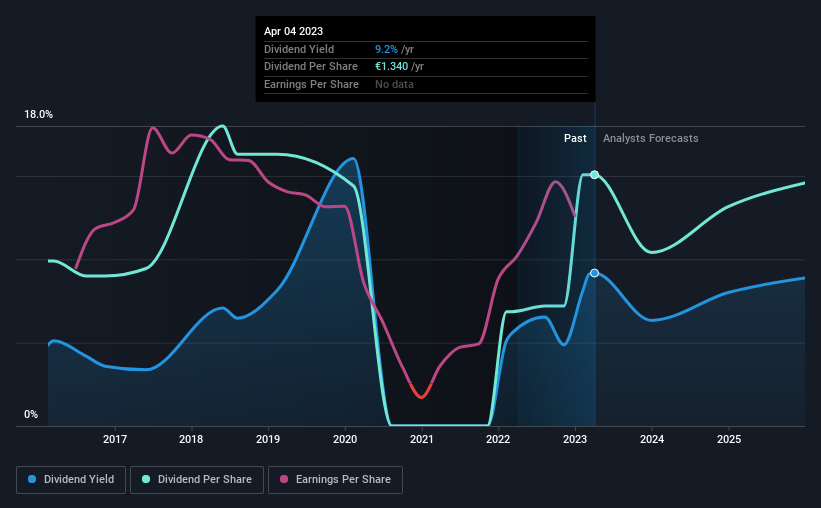- Netherlands
- /
- Banks
- /
- ENXTAM:ABN
ABN AMRO Bank (AMS:ABN) Will Pay A Larger Dividend Than Last Year At €0.67

ABN AMRO Bank N.V. (AMS:ABN) has announced that it will be increasing its dividend from last year's comparable payment on the 17th of May to €0.67. This takes the dividend yield to 9.2%, which shareholders will be pleased with.
Check out our latest analysis for ABN AMRO Bank
ABN AMRO Bank's Dividend Forecasted To Be Well Covered By Earnings
Impressive dividend yields are good, but this doesn't matter much if the payments can't be sustained.
ABN AMRO Bank has established itself as a dividend paying company, given its 7-year history of distributing earnings to shareholders. Past distributions do not necessarily guarantee future ones, but ABN AMRO Bank's payout ratio of 51% is a good sign for current shareholders as this means that earnings decently cover dividends.
Over the next 3 years, EPS is forecast to expand by 35.1%. Analysts estimate the future payout ratio will be 50% over the same time period, which is in the range that makes us comfortable with the sustainability of the dividend.

ABN AMRO Bank's Dividend Has Lacked Consistency
Looking back, ABN AMRO Bank's dividend hasn't been particularly consistent. If the company cuts once, it definitely isn't argument against the possibility of it cutting in the future. Since 2016, the dividend has gone from €0.88 total annually to €1.34. This works out to be a compound annual growth rate (CAGR) of approximately 6.2% a year over that time. We have seen cuts in the past, so while the growth looks promising we would be a little bit cautious about its track record.
Dividend Growth May Be Hard To Come By
Given that the dividend has been cut in the past, we need to check if earnings are growing and if that might lead to stronger dividends in the future. ABN AMRO Bank has seen earnings per share falling at 6.7% per year over the last five years. If earnings continue declining, the company may have to make the difficult choice of reducing the dividend or even stopping it completely - the opposite of dividend growth. It's not all bad news though, as the earnings are predicted to rise over the next 12 months - we would just be a bit cautious until this can turn into a longer term trend.
Our Thoughts On ABN AMRO Bank's Dividend
Overall, we always like to see the dividend being raised, but we don't think ABN AMRO Bank will make a great income stock. While ABN AMRO Bank is earning enough to cover the dividend, we are generally unimpressed with its future prospects. Overall, we don't think this company has the makings of a good income stock.
Investors generally tend to favour companies with a consistent, stable dividend policy as opposed to those operating an irregular one. At the same time, there are other factors our readers should be conscious of before pouring capital into a stock. Case in point: We've spotted 2 warning signs for ABN AMRO Bank (of which 1 is potentially serious!) you should know about. Looking for more high-yielding dividend ideas? Try our collection of strong dividend payers.
New: Manage All Your Stock Portfolios in One Place
We've created the ultimate portfolio companion for stock investors, and it's free.
• Connect an unlimited number of Portfolios and see your total in one currency
• Be alerted to new Warning Signs or Risks via email or mobile
• Track the Fair Value of your stocks
Have feedback on this article? Concerned about the content? Get in touch with us directly. Alternatively, email editorial-team (at) simplywallst.com.
This article by Simply Wall St is general in nature. We provide commentary based on historical data and analyst forecasts only using an unbiased methodology and our articles are not intended to be financial advice. It does not constitute a recommendation to buy or sell any stock, and does not take account of your objectives, or your financial situation. We aim to bring you long-term focused analysis driven by fundamental data. Note that our analysis may not factor in the latest price-sensitive company announcements or qualitative material. Simply Wall St has no position in any stocks mentioned.
About ENXTAM:ABN
ABN AMRO Bank
Provides various banking products and financial services to retail, private, and business clients in the Netherlands and internationally.
Very undervalued with excellent balance sheet and pays a dividend.

